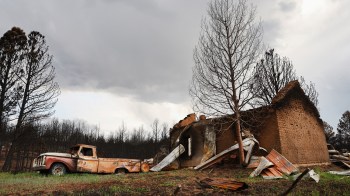Latino entrepreneur adapts to survive in Las Vegas
Share Now on:
Latino entrepreneur adapts to survive in Las Vegas
Kai Ryssdal: The housing-induced recession here in Las Vegas happened — very roughly speaking — this way. Tourism slowed down. Waaaay down. So there were fewer casino jobs and fewer people coming, which meant not as much housing demand, which meant fewer construction jobs.
A lot of those building jobs were done by Latinos. Over the past couple of decades, the number of Latinos in the Las Vegas area grew from 80,000 to 580,000. And some of those Latinos started businesses that succeeded while times were good and jobs plentiful.
From Nevada Public Radio, Adam Burke has the story of an entrepreneur who thrived in the boom and made it through the bust.
Adam Burke: Norberto Madrigal was just 10 when his father brought home an old International pickup truck to start the family business.
Norberto Madrigal: I don’t where he got it. But all I know is that the thing barely ran, and he did his best to make it shine and look pretty.
Another problem, the truck had no sides on the back end. So Madrigal’s father fashioned homemade sides from used plywood. He painted the plywood black and started hauling trash away from Las Vegas construction sites.
Madrigal: I mean the thing probably had four or five gears, and it was running three gears, you know? High RPMs and they would just grind. RRRrrrrrrr!
Twenty-three years later, Lunas Construction has over a hundred vehicles; it haul 125,000 tons of waste a year. And Madirgal’s waste disposal business has basically turned into a recycling company.
Madrigal: This is where the magic happens. Trash comes in, cash comes out!
Inside a warehouse at the outskirts of Las Vegas, trash is spread out on conveyer belts, where it’s tumbled around and separated. A dozen workers fish out the valuable stuff.
Madrigal: You’ve got the wood, you’ve got the grass clippings, the plastics and the papers, and two-by-fours.
This new $2 million facility came online last year. Now Madrigal needs more business to support it.
Madrigal: If we don’t have that waste, we might as well close our doors because that’s the only way we’re gonna pay for the lights to stay on.
During the housing boom, nearly all of what Lunas took in was construction waste. Now just 20 percent of Lunas waste comes from construction sites. And the whole operation is leaner. By late 2010, the family had off more than three-quarters of employees.
Madrigal: It’s a horrible feeling to let people go. To know that they depend on you and they have expenses to pay. It’s just a horrible feeling.
But Madrigal says many of the other Latino small business owners in Las Vegas have fared worse — especially entrepreneurs with close ties to the construction industry.
Madrigal: A lot of guys I haven’t even heard from. I don’t even know what happened with them. It’s kind of like they just disappeared. They closed shop and they were probably ashamed and took their families with them, and just took off to another state.
So Norberto Madrigal and his family continue their hunt for those valuable things that we throw away. One of his recent quests — traveling the world to find out everything he can possibly learn about used tires.
Madrigal: I went down south to Mexico, Nicaragua, China, to Taiwan. I mixed and matched the ideas that I found. And now — whether it’s a bicycle tire or heavy equipment tire — it doesn’t matter. I can get rid of any tire, I can recycle all of ’em.
Lunas is making and selling ground tire rubber, it’s extracting metal from steel-belted radials. And it now owns a special machine that slices the sidewalls off of tires.
Madrigal says he can sell sidewalls for 8 cents apiece to company in Mexico that’ll turn tire rubber into sandals.
In Las Vegas, I’m Adam Burke for Marketplace.
There’s a lot happening in the world. Through it all, Marketplace is here for you.
You rely on Marketplace to break down the world’s events and tell you how it affects you in a fact-based, approachable way. We rely on your financial support to keep making that possible.
Your donation today powers the independent journalism that you rely on. For just $5/month, you can help sustain Marketplace so we can keep reporting on the things that matter to you.


















